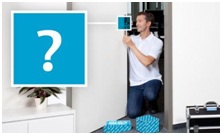
What factors determine the right access control for a building or business? Desirability and security must always weigh alongside what is affordable or available in the electronic access control market, of course. Thomas Schulz, EMEA Marketing & Communications Director, Digital and Access Solutions, Assa Abloy Opening Solutions EMEA, suggests the following 5-point checklist to help develop a strategic approach to choosing the right access control solution.
Can the existing system be extended?
Security needs change over time. Locks which “plug in” integrate with an existing system, extending its reach or capability. They can save substantial amounts of money. This is why, for future investments, it makes sense to choose locks built on open architecture. It gives flexibility going forward, enabling users to choose the right locks for the job, not just the best available within a walled ecosystem.
Wireless locks like Aperio, for example, work seamlessly with systems from over 100 different access control providers globally. They can integrate online or offline. Users continue with their existing credentials — so an access control extension, like the integration is seamless.
What is the structure of the site or sites?
Locks tailored for high-traffic and low-traffic doors, indoor and outdoor use will be required. Almost everywhere, wireless locks are easier to install and maintain than wired locks. Battery-powered locks are more energy efficient to run and only wake-up when presented with a credential. They therefore align with any corporate sustainability targets.
Certified wireless security locks add protection for sensitive areas and/or those with stringent standards or regulatory compliance demands. The chosen locking system should handle installations at a single site with standard doors and remote sites in the field with specialist access point applications.
Who are the current and future users and what credentials suit their needs?
Most companies must filter access for permanent staff, short-term contractors and visitors, at least. An access system should be flexible enough to cope. This includes the issue of credentials. Different systems offer credentials stored on cards and fobs, or on programmable, battery-powered keys.
Increasingly, when future-proofing access control for convenience, mobile access control must be a consideration. An estimated 44 million mobile credentials will be downloaded by 2021, according to a recent IHS Markit forecast. To take one example, the Openow app for the Smartair wireless access systems makes a user’s smartphone into their virtual key. Facility managers issue and revoke user “keys” using intuitive software, also app-based. It is an efficient, flexible mobile solution to meet user expectations for the next decade.
A mobile workforce operating at dispersed sites has different mobile credential management needs. For example, secure programmable keys easily updated via Bluetooth and an app — like Assa Abloy’s Cliq Connect solution — will save a business wasted journeys to and from base to collect or return keys.
Will a single system secure more than just doors?
Many wireless system product ranges include locks for cabinets, machines, elevators and/or server racks. For outdoor access points, gate locks or padlocks certified for extreme climates and/or with higher IP ratings will be needed.
From a facility management perspective, there are workflow efficiency gains from monitoring all “non-doors” — medicine stores, car parks, lockers or lifts — from the same software interface as your doors. From a site user’s point of view, the convenience of carrying one credential for every access need is obvious. Better still if this credential is on the phone they already carry (see above).
Does your access control need to be in real time?
Choose an online access control system and you can manage and amend door security at any time and from anywhere you can access its admin software. You can monitor sensitive medicine stores remotely and in real time — and revoke access rights if a credential goes missing. In an emergency, remotely locking or unlocking an entrance could be critical.
Aperio wireless locks, for example, integrate via hubs with online electronic access and real-time monitoring systems in hospitals, schools, warehouses, student halls and many more secure environments. With some wireless systems, including Smartair, users can combine “Update on Card” and online updating for different doors within the same building. Wireless access control offers this compelling mix of security, flexibility, compliance, ease of installation, cost-efficiency and seamless integration. Most importantly, it’s a future-proof technology that can be deployed right now.










